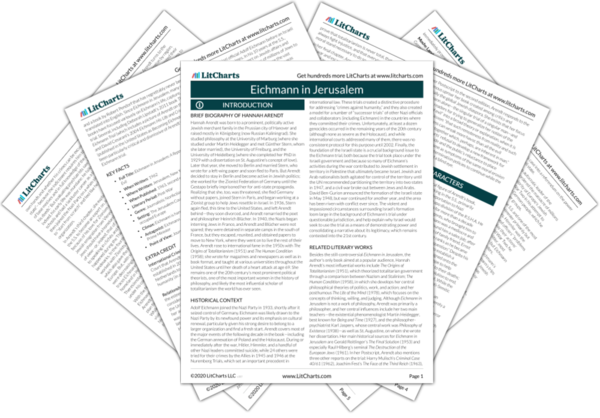German Foreign Office Quotes in Eichmann in Jerusalem
Eichmann himself, after “consulting Poliakoff and Reitlinger,” produced seventeen multicolored charts, which contributed little to a better understanding of the intricate bureaucratic machinery of the Third Reich, although his general description—“everything was always in a state of continuous flux, a steady stream”—sounded plausible to the student of totalitarianism, who knows that the monolithic quality of this form of government is a myth.

Unlock explanations and citation info for this and every other Eichmann in Jerusalem quote.
Plus so much more...
Get LitCharts A+Politically and psychologically, the most interesting aspect of this incident is perhaps the role played by the German authorities in Denmark, their obvious sabotage of orders from Berlin. It is the only case we know of in which the Nazis met with open native resistance, and the result seems to have been that those exposed to it changed their minds. They themselves apparently no longer looked upon the extermination of a whole people as a matter of course. They had met resistance based on principle, and their “toughness” had melted like butter in the sun, they had even been able to show a few timid beginnings of genuine courage. That the ideal of “toughness,” except, perhaps, for a few half-demented brutes, was nothing but a myth of self-deception, concealing a ruthless desire for conformity at any price, was clearly revealed at the Nuremberg Trials, where the defendants accused and betrayed each other and assured the world that they “had always been against it” or claimed, as Eichmann was to do, that their best qualities had been “abused” by their superiors. (In Jerusalem, he accused “those in power” of having abused his “obedience.” “The subject of a good government is lucky, the subject of a bad government is unlucky. I had no luck.”) The atmosphere had changed, and although most of them must have known that they were doomed, not a single one of them had the guts to defend the Nazi ideology.












